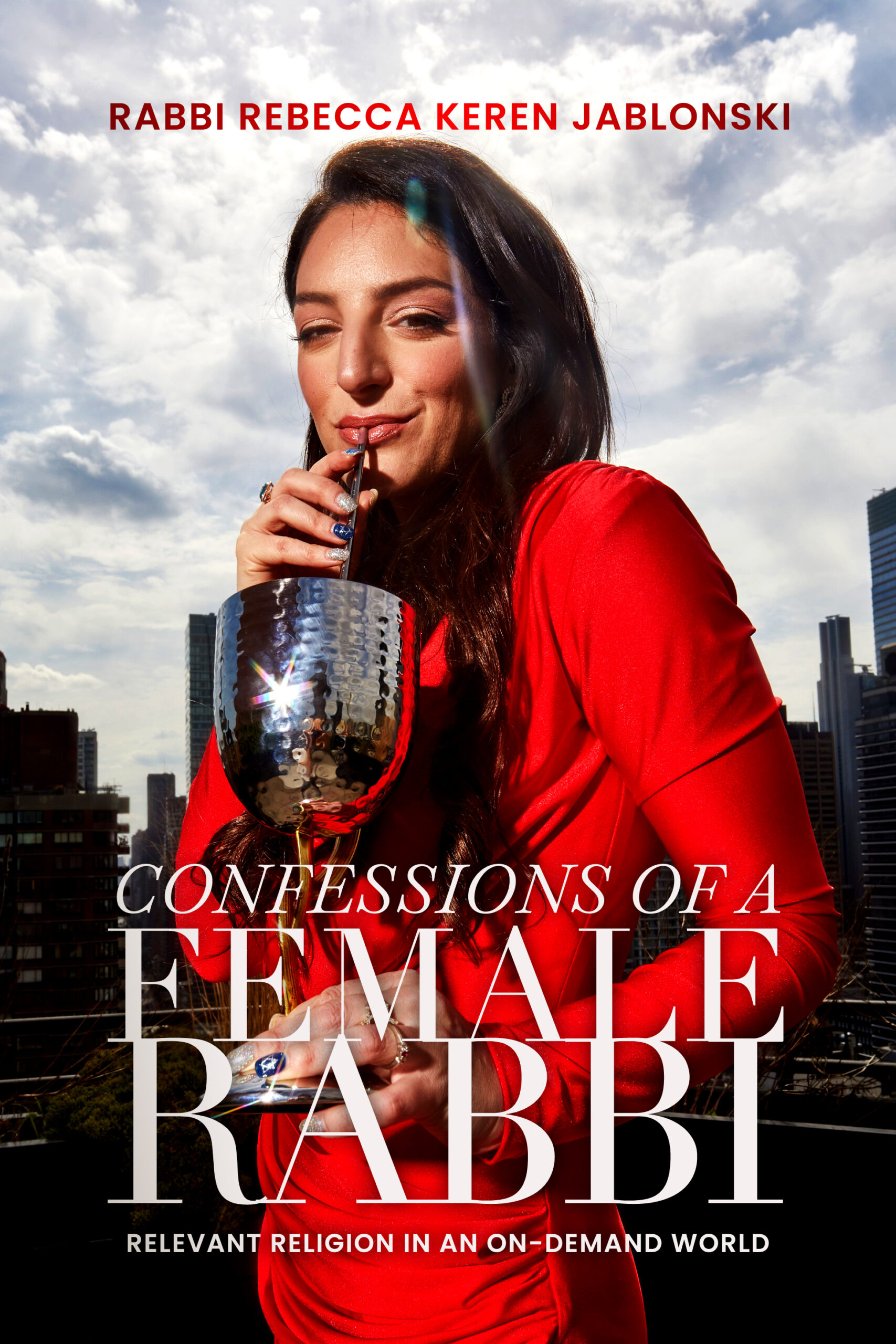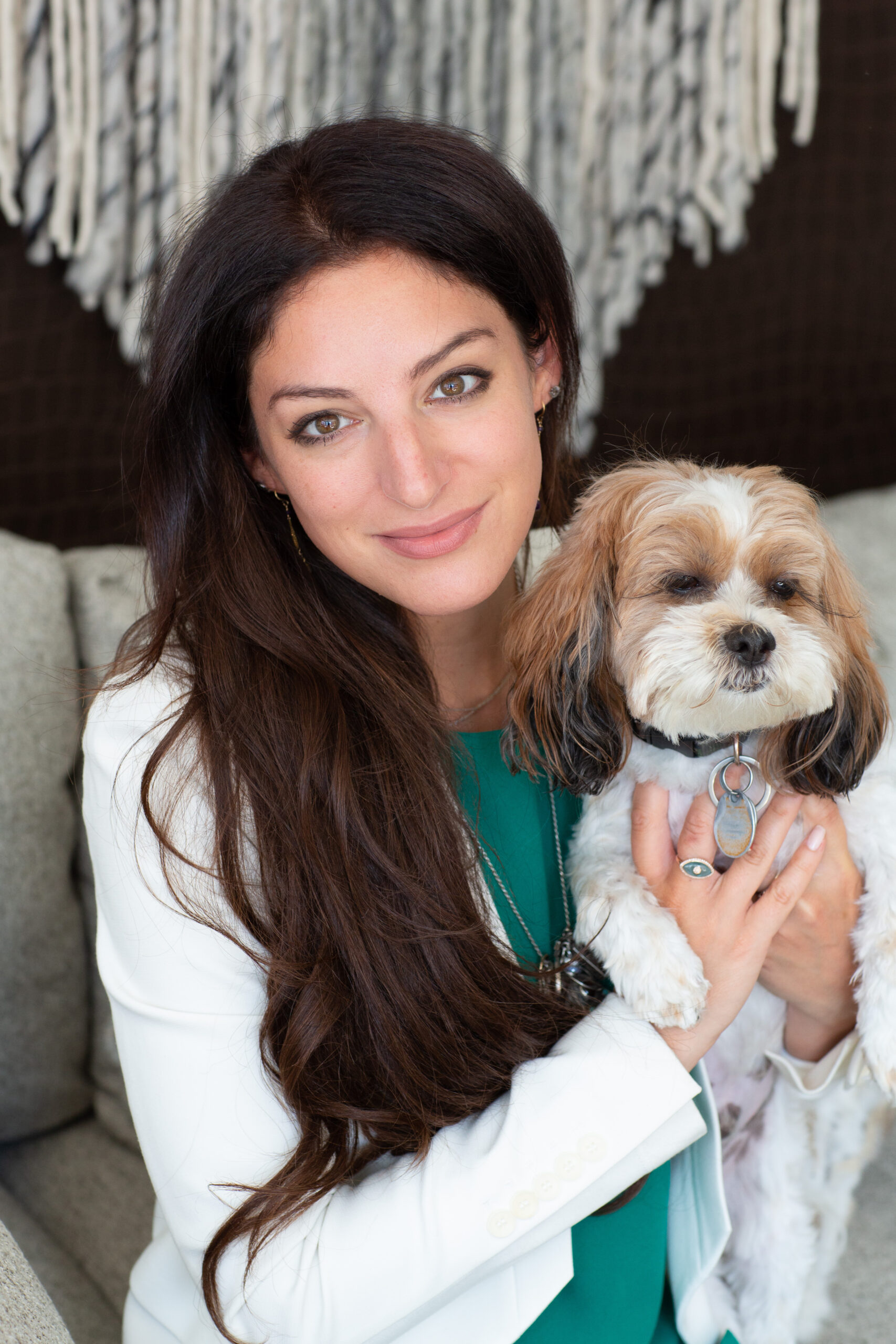Believe it or not, all religions evolve and change. As church and synagogue attendance is in record decline, this young female rabbi has found a way to meet families from a variety of backgrounds in the modern world and help them connect with the traditions and practice that they crave. Rabbi Rebecca Keren Jablonski has served world-wide, bringing bespoke and creative religious experiences to those who sought spirituality outside of institutions and denominational confines. With disruptor brands changing the way we consume products and information, religion is also in need of a 3,000 year-old facelift, or at least a mini makeover. There is room in the pews for new leaders with innovative strategies and approaches to keep religion relevant and meaningful in today’s times.
Her new book, Confessions of a Female Rabbi, traces the changes in our current multi-faith landscape, hone in on what’s happening with the Jewish American community, and demonstrate through case studies how she’s been successful delivering transformations for families through the prism of religious practice and observance. These confessions express her unique perspective, personal and collective shortcomings, and reveal her insights as a reflective and relatable spiritual facilitator. Touching universal stories of birth, coming of age, weddings, divorce, conversion, and sacred times affirm the deeper meaning we all can find if we make space for something holy in the circle of life.
Meet Rabbi Rebecca;
So, who am I and why should you care? I’m Rabbi Rebecca Keren Eisenstadt—oh now Jablonski—but you can call me Becky. I’m a young, Jewish woman from Maryland with a strong Jewish identity and values. But I’ve been living in Manhattan for twenty years and I’ve learned how to adapt to the world as it has changed. As Julia Gergely’s award-winning profile in the Jewish Telegraphic Agency stated, I’m the “Uber of rabbis.” I’m not just a religious provider
who meets people in their homes, I meet people where they are at; I see where they want to go and devise a plan to get them there. And I make the process interesting, meaningful, and fun—as it should be. However, a major difference between Uber and my services is that your Uber driver is a one-off and I’m not. Uber is a transactional business and I often make a lasting bond with my client. Nonetheless, ride sharing apps make finding reliable transportation seamless and I make religion accessible and more available than your average American clergy. Also, my model is bespoke, boutique, and personal with each person or cohort I serve. That recipe is what’s in-demand to take people on various spiritual journeys and remain active and prideful during these dark times.
With nearly two decades working for mostly New York-area clients, I have created a niche with some of the most prominent families in the world. I started out as being one the most sought-after Hebrew and bar mitzvah preparation tutors in the tristate area. When I attained rabbinic ordination, my services expanded to weddings and more, like baby namings, funerals, and conversions. According to the Jewish religion, almost every lifecycle moment can be performed by simply a knowledgeable person—it doesn’t have to be a rabbi. Still, most of my clients feel more comfortable having a rabbi oversee religious moments and I’ve been extremely busy ever since I earned my official title. Sometimes, I call it my sash and crown. I’ve been blessed to watch some children grow since they were literal babies and continued to advise them as they navigated campus life and antisemitism outside of New York. I’ve become more than just a clergy member to families; I’m integrated into a family which allows us all to mutually care for one another. I am present for a family’s happiest occasions and saddest moments. I am with them on vacation, at parties, and in their homes while they are wearing pajamas on the weekend. The institutional demands and expectations of most formal synagogues do not allow for pulpit clergy to have such informal roles and availability.
Most of the time when I reveal that I’m a rabbi, people are shocked. I’m a one of a kind religious leader—party planners call me the “Hot Rabbi.” My Instagram handle, @myhotrabbi, has thousands of followers from every walk of life. I’m the only rabbi around town with super long hair, makeup, and can be seen wearing either workout clothes while carting around my little shih-poo (that’s a shih tzu-poodle mix) dog, Scout, or decked out in a ball gown for a fabulous celebration. For a while, I was also single and people loved setting me up, or hearing about the trials and tribulations of New York City single life through the eyes of someone Jewishly-observant. Thank heavens, as of March 2024, I am married to the most wonderful man, who has been my friend for seventeen years. After meeting at a Shabbat dinner and getting closer through his foundation, Building Together (Palestinians and Israelis building relationships together through farming and economic development), Ben Jablonski finally asked me out, and in less than a year, we were engaged in Jerusalem—the same place my parents got engaged.
People constantly come up to me asking for advice for their families, children’s learning, or how to integrate more religious values into their homes. Frankly, for a long time, I wasn’t ready to tell my story of how I became a rabbi to serve a need in the Jewish community. I used to think I was doing something wrong by helping people have services apart from the traditional model or away from their synagogues. But my views have evolved. Now, I see how people crave meaningful experiences that are different and personal. I’m ready to share and perhaps inspire other families to seek out similarly meaningful experiences. I also want to encourage Jewish leaders to become providers like me. I never instruct people to discontinue their synagogue memberships. I can add value, supplement, or make up where others’ needs or preferences are not met. Religion is not one-size-fits-all—to carry the clothing metaphors—no one has a closet full of only one brand of clothes. When I grew up, I was used to going to several synagogues and had many rabbis as teachers. I want to remind American Jews that they can and should have multiple religious providers in multiple institutions. Now the numbers of people leaving the traditional ways of observance and membership are so large, I feel like I’m playing a part in keeping families still engaged in their Jewishness.
I’m a totally new model of clergy or rabbi in the US. In her best selling book, coauthored by former NFL player Emmanuel Acho, titled Uncomfortable Conversations with a Jew, secular Israeli activist Noa Tishby explains her favorite parts about Judaism. “It’s a decentralized religion. Meaning you don’t really need a single designated place, such as a synagogue, to practice it. Our temples had a nasty habit of being destroyed, and Jews tended to be kicked out of most places they lived. So Judaism went through a sort of rebrand that made the community the center of the sacred, as well as the individual—meaning (most of) our rituals could travel with us and be just as sanctified.” Tishby reminds us that ever since the destruction of the First and Second Temples in Jerusalem, Judaism has evolved. Judaism can be practiced individually and includes a big tent of multiple religious denominations, observance levels, and providers. I am a leader in the decentralized and post-denominational era.
Moreover, to know me, you don’t have to leave your house and pay membership dues. Most of the time you see a religious leader in formal attire or costumed on a platform or stage. Most parishioners, especially Catholics and Jews, are used to passively watching their preacher high up on a pulpit and dressed in ritual garb. Often the congregation is silent while the clergy leads, chants, and performs words of worship for all. By the way, the clergy is almost all male, even though there has been a growing number of female rabbis since the late 1970s. This keeps many feeling distant from the leaders, religion, and G-d itself. I have heard complaints of synagogues and churches being tired and stale. Patrons who turn to me have previously felt like they were one of the sheep, among the masses, obligated like everyone else to attend and be bored—and they pass that dreaded experience to their children. With me, I dress and act like the people I serve. I purposely balance the formal and informal, sitting on their floor and standing on the religious stage with my clients. I lead with songs they recognize and know from their communities and upbringings.
I am a goal-oriented rabbi and my goal is to get Jewish.
I hate labels. I say I’m nondenominational. Sometimes I say I’m “Hipsterdox,” which means I’m hip and cool about a lot of things and strict about others: you’ve got to stay continjewed to figure out what I mean. I live every part of my life this way. I’ve always cared that the Jewish people continue to thrive alongside their neighbors. I care about the continuation of our traditions as an ethnic group and religious people. I know the only way to do this is to appeal to people through their hearts and emotions, but back everything up with facts. I try to find what they are missing and deliver it in a fun and meaningful way. I build a lasting connection with each of my clients and help them realize how they are fulfilling something great in the chain of our people and in themselves through our work together. I believe most congregational rabbis hold similar aspirations and heartfelt intentions; they are limited by organizational structures and role expectations of an esteemed rabbi.
Enjoy the book: Am Yisrael Chai

Rebecca Keren Jablonski is a rabbi, author and private educator. Her highly-anticipated debut memoir Confessions of a Female Rabbi: Relevant Religion in an On-Demand World was was released in August 2024 by Viva Editions/Simon & Schuster. She is also a contributing author featured in On Being Jewish Now, Essays and Reflections from Authors and Advocates (Zibby Media, Oct 1). Rabbi Rebecca obtained semicha from Mesifta Adas Wolkowisk in New York and graduated with honors from NYU’s Tisch School of the Arts. With more than 15 years working as an on-demand one-woman synagogue, Rebecca is the new type of clergy keeping religion relevant. She works with various synagogues and families all over the world and officiates weddings, bar and bat mitzvahs, funerals, baby namings, bespoke holiday gatherings and other Jewish life cycle events. She serves on the board of Building Together: Building Relationships between Palestinians and Israelis, and is involved in many other charities. She resides in New York City with her husband, Ben, and their Shih-Poo, Scout.

Confessions of a Female Rabbi. Copyright © 2024 by Rebecca Keren Jablonski.
All rights reserved. Except for brief passages quoted in newspaper, magazine, radio, television, or online reviews, no part of this book may be reproduced in any form or by any means, electronic or mechanical, including photocopying or recording, or by information storage or retrieval system, without permission in writing from the publisher. Published in the United States by Viva Editions, an imprint of Start Midnight, LLC 221 River Street, 9th Floor, Hoboken, New Jersey 07030.




